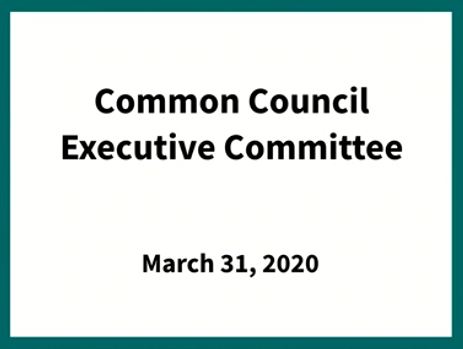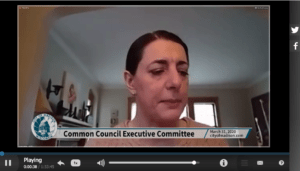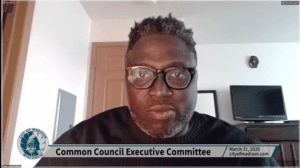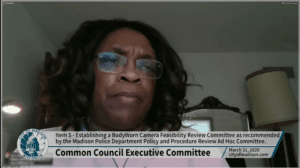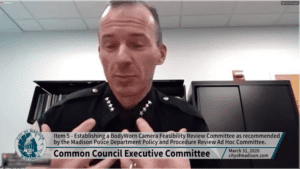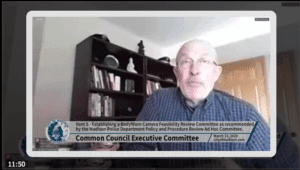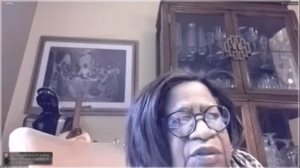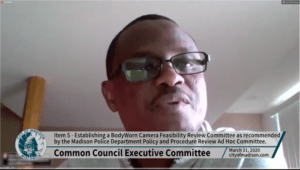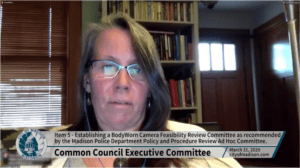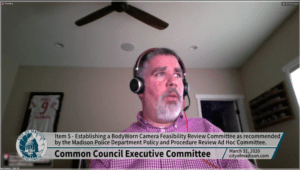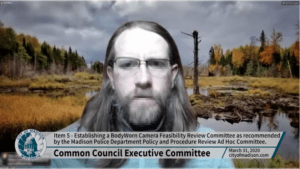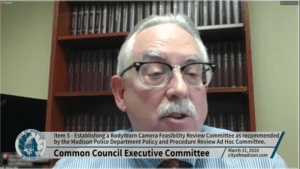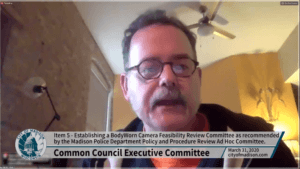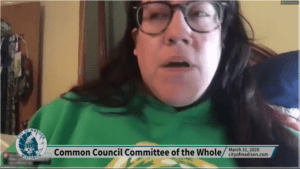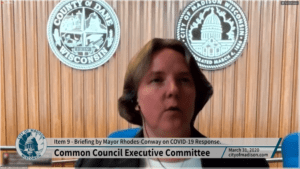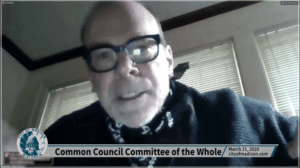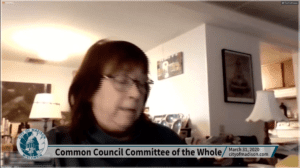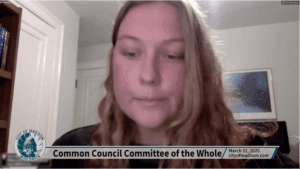Items deemed essential to talk about are creating a body worn camera committee, MPD report on Ad Hoc Committee recommendations, discussion on surveillance camera policy is referred, Mayor briefs them on COVID-19 responses and council discusses their role in government during the pandemic.You can follow along here if you are interested, and here is the agenda
GETTING STARTED
Alder Bidar gets the meeting started.
She reads some instructions about how to participate in the meeting that is printed on the agenda:
1. WRITTEN COMMENTS: You can send comments on agenda items to allalders@cityofmadison.com
2. WATCH THE MEETING: You can call-in or watch the Common Council Execute Committee in several ways:
• Listen to audio via phone: (312) 626-6799, WEBINAR ID: 954 410 442
• Livestream on the Madison City Channel website: https://media.cityofmadison.com/mediasite/showcase/madison-city-channel/channel/additional-meetings
• Livestream on the City of Madison Youtube Channel: https://www.youtube.com/user/CityofMadison
• Television: Watch live on Charter Digital 994 and AT&T U Verse 99
• You can watch the meeting using the Zoom app. Find how to watch the meeting via Zoom at www.cityofmadison.com/virtual-cecc
3. REGISTER BUT DO NOT SPEAK: You can register your support or opposition to an agenda item without speaking at www.cityofmadison.com/comment-cecc
4. REGISTER AND SPEAK: If you wish to speak at the virtual meeting on an agenda item, you MUST register. You can register at www.cityofmadison.com/comment-cecc. When you register to speak, you will be sent an email with the information you will need to join the virtual meeting.
The chief of staff does a roll call.
Shiva Bidar, Barbara Harrington McKinney, Arvina Martin, Tag Evers, Sheri Carter, Grant Foster, Rebecca Kemble and Samba Baldeh are all present.
There is no way for the public to know who else is on the call, they did not indicate that.
They approve the minutes. They approve the minutes by unanimous consent, alders indicate agreement by shaking their heads. Again, we can’t see this happening, but the chair announces there was no one against.
Public Comment – there is no general public comment.
There are no disclosures or recusals
POLICING ISSUES
Questions of Staff
Cam McClay and Chief Wahl are available to answer questions.
Alder Sheri Carter says that they have been talking about body cameras since 2014 and there is a report that was submitted in 2015, so what are you looking at different than what they have voted on and the reports that have been submitted.
Bidar asks who the question is for?
Carter says its for Chief Wahl
Police Chief Vic Wahl says the resolution is not from MPD. He freezes
and we miss what he says – something about compromise and OIR report. It’s not something they are pushing for. They are not in support of some of the language added in during the committee process. He says that he hears, from time to time in the community, an interest in revisiting body cameras, he thinks there is an interest in the community. He says several years have passed since the original committee discussed it, there are improvements to technology and its probably worth taking a fresh look at it if done properly.
Carter ask Deputy Mayor Cam McLay or Alder Marsha Rummel – She says they have significant information from the past, including the community committee that came and presented to the council that stated that the community in general did not feel they would be any safer with police with body cameras or without. That was at a time when they were looking at a pilot program and were going to be given body cameras for a certain period of time. Will this group be utilizing some of that information we already have and not try to recreate the wheel and use that information.
Bidar calls on McLay. He says that this wasn’t necessarily a recommendation that their office or the police department pushed forward. This comes from the original ad hoc final recommendations, the very last one, recommendation #177 called for the creation of a committee to be comprised of members of the ad hoc, members of the original body camera study group and members of the MPD to explore the questions from the OIR report and they specifically enumerate recommendations 134-139. Those were all things relative to body worn cameras. From the standpoint of a value add, the offering of someone to look at the issue of body worn cameras that is something he thinks is a good idea. Meaning the problem is very nuanced, very complex, if the Madison Police Department ever envisioned wanting to implement a body worn camera program, the only way they’d be able to do it is with a really robust community engagement. So if this body wants to focus its efforts on researching the body worn camera question, he thinks that would be a value add. The additional language Chief Wahl mentioned that was added at the Equal Opportunities Commission – expanding the scope of the committee is arguable a little less helpful. The language added talks about “the committee may address other issues relative to the implementation of other recommendations in the ad hoc committee if recommended by council. The TFOGS recommendations that we have fewer not more committees notwithstanding the challenge he says that we are proposing a task force committee, not a standing one. A Task Force Committee really needs a specific job we are asking them to do and a realistic time frame in which to do it, a finite timeframe, whether it is an end date or a deliverable. This additional language creates a level of complexity that he can envision to be problematic, because it is duplicative of the role of the Public Safety Review Committee. If the intention is to research body worn cameras and have this committee do it, he thinks it makes perfect sense from a change management standpoint, because neither the MPD nor any of the rest of us have the bandwidth right now to research this topic. But if we want them to be expanding to a host of other issues then we run into potential conflicts with the role of the PSRC and conflict between the mayor’s office, the police department, HR who are working hard to implement the primary recommendation from the ad hoc which was the creation of the civilian auditor or monitor position and the oversight committee to accompany it. All of their effort has been really focused on what the ad hoc committee said was most important to them so to be focused on the concrete and body worn cameras he sees as adding value. To have duplicative roles creates confusion that might actually slow down what is most important to us.
Bidar clarifies the motion before them is the original resolution. She doesn’t call on Alder Rummel to answer the question, but asks others if they have additional questions.
Alder Barbara Harrington-McKinney asks if the findings of the original body worn cameras committee would be looked at and she says the answer is yes. She says one of the discussions of the Public Safety Review Committee, one of the requests is to take a look at the very robust conversation and the outcome of that committee. We had requested to take a look back and see what the occurrences that happened in that committee and to re-read that report. She agrees we should have very defined and specific guidelines to produce the outcome that is intended by this committee.
Bidar asks for questions of staff.
Alder Samba Baldeh says this question might not be relevant now, but if this committee is approved and set up, what is the expected cost for cameras. Does anybody have any feeling around how much this will cost the city in case the committee recommends that we implement a pilot project or a full fledged body owned cameras for the police department.
Bidar directs the question to Chief Wahl.
Wahl says that when the previous committee was up and running they did some cost estimates and the cost estimate for a full operational deployment that the body camera program was close to a million dollars and the pilot was in the $90,000 range. They have not refreshed those numbers, that might change depending on new tecnology, new costs, new server storage needs, but that’s a ballpark.
Baldeh says that one thing that brought this conversation forward was the relationship between police and communities around the country. Are you able to speak to where that is right now in regards to MPD and the community.
Wahl asks if he is asking about the general state of trust or how body cameras might impact it.
Baldeh says the relationship with the community, in the last few years it has been… communities of color and how they relate to police was not good, so the thinking was the having body worn cameras could help sometimes on the suspicion around what is happening between the law enforcement community and people of color. In other words, what necessitates looking at this again, going back to Sheri’s previous question.
Wahl says on the question on how they are doing with public trust, he says he thinks they are in decent shape but the certainly have plenty of room for improvement. Something they put a lot of time and effort into – building relationships and poured a lot of resources and effort to, but certainly they have plenty of room to grow and he personally doesn’t view the body camera issue through that prism. There has been a lot of discussion about how body cameras will improve public trust and things like that but to him those felt sort of ancillary. He looks at it from a practitioner that in terms of having evidence, for internal complaints or criminal investigations, having that evidence of a body camera can help prosecution, it can help the city defend itself against frivolous lawsuits and things like that. We have in car video and the squad cameras that they have had for decades and they don’t view those through a prism of public trust generally, its more for an operational expectation of professional police agencies these days. There can be benefits to public trust in cases of critical incidents, because a body camera can give evidence that is impartial and that can help the community recognize what happened, good or bad. So it can have some ancillary benefit to community trust and support, but he doesn’t view that as the core reason to . . .
Discussion
Alder Rebecca Kemble moves an amendment adoption the language that was adopted at the Equal Opportunities Commission. It is seconded by Alder Tag Evers.
Alder Kemble says this is a long strange trip that is ending up with this and the next item on the agenda, item number 6, requesting that the MPD produce a summary document of MPD Policy and Procedure Ad Hoc Committee recommendations. She says when they adopted the report of the Ad Hoc Committee they changed the language to adopt it as well as adopting their recommendations which were modified by both the PSRC and the Equal Opportunities Commission at the time to set up a committee and in the language of that recommendation it said an oversight committee and then it specifically reference for body cams #177 recommendations. Both the PSRC and the EOC felt it was very important for those that had been working on the recommendations to be able to assist the common council as we provided our oversight over this policy that we adopted. Both of those bodies also added to the recommendation that this new committee should be made up of former ad hoc committee Madison Police and Policy Ad Hoc Committee members, former body cam committee members and one member from PSRC and one member from EOC. Because both of those bodies had a keen intention and interest on following up, not just on body cams but in all of the recommendations. At the EOC meeting, the EOC members were asking what happened to our recommendation? They asked for the committee to be tracking all the recommendations and the answer to that is that original intention got framed into these two items, split off so that MPD is doing the matrix of all the recommendations and then this committee is just looking at body worn camera, those 4 recommendations in #177. At EOC we voted 6-1 to add this language “Be it further resolved that the committee may address issues related to the implementation of other recommendations from the ad hoc committee report if referred to them by the common council.” That gives us, as we monitor based on item #6 coming up, based on a report we get from MPD, as we monitor those things, we can have access to the people who developed the recommendations, who will be sitting on this committee, if we have any questions or concerns, we want their formal input on. We can always get input from individuals one by one coming to us as we take up the whole of the recommendations, but that tends to give certain individuals outsized influence in the process and not everyone is motivated every time to track our agenda and see when this is coming up. They thought having this committee as back up for us, for them to be able to think together and mull over and debate within themselves instead of just having individual opinions about how other recommendations are being implemented, would be good for us as public policy makers and as the body tasked with overseeing the implementation of all of these adopted recommendations.
Alder Carter says if the council is able to add other items for them to look at is this task force turning into a permanent committee, or does the task force have a sunset and the second question is if they are to provide us with a report, is this another instance where we have to hire a consultant to write the report for the task force.
Alder Keith Furman shares concerns that Alder Carter pointed out with the modification of this committee, he understands the request to do the body worn camera, that is a specific recommendation, but he is fearful of letting that committee have scope creep and do a lot more stuff, where does that end. Why wouldn’t we be using the Public Safety Review Committee or the Oversight Committee that will be in place at some point, or re-instituting the Ad Hoc MPD Policy and Procedure Committee. It seems like this is going to be a much more complicated committee than what the original intent was and he thinks that is a mistake.
Kemble says that this is a little over half of the former ad hoc committee and the reason to use this instead of PSRC because they are literally the people who developed the recommendations and understand the spirit and understand the discussions and everything that went into creating them. The PSRC does not have that capacity. If we as a council, are having questions about what did they mean about recommendations, is the way its being implemented in sync with that, that we have them as a resource to go to and she doesn’t think its adding a ton more work, its something we as a council can have in our back pocket to inform our decisions in a much more robust way. This resolution has a sunset of December 31st of this year. Our abilitty to have them as a resource isn’t an undue scope creep.
Baldeh is wondering why is it that we cannot get the police department to give the same report. For equity purposes it is important that we have a new set of eyes on this committee as opposed to using the same old folks, not that they have not been doing an excellent job, but for equity purposes, it is important to have another set of eyes to look at this.
Alder Grant Foster asks Attorney May about if they have the ability as a common council to refer an additional item if it is created if the language is not in the forming resolution, or does the language have to be included in order for us to be able to refer some other item to it.
City Attorney Mike May says normally the resolution they adopt sets the authority and jurisdiction of any ad hoc body. That says what you want them to look at. And if you decide you want something else to be looked at you would either amend the resolution and say we want to give them additional authorities or set up a new body or adopt a new resolution to send something to them that wasn’t in the original one. Yes, if somewhere down the road you decide there is something else you want this committee or any other ad hoc committee to look at you can introduce a resolution and say we are referring this matter to this body and we amend their charter to be able to take up this issue.
Foster clarifies that if they want to do this the recommendation is to amend this resolution at that time and do a referral subsequent to that. We wouldn’t be able to just refer something without changing the resolution.
City staff explains how to raise their hands.
Alder Heck says that also in legistar is the PSRC’s recommendation that’s slightly more focused and suggests that we add language that allows other items to be referred to this committee if they are camera related. And PSRC recognized that it is a little bit subjective as to if something is cam related, but it opens up possibilities but also narrows the scope. He can’t speak for all of PSRC, but when we considered this item I repeatedly said that I felt like PSRC was not the appropriate body to be taking up these matters because we don’t have the expertise that the ad hoc committee members have and the surveillance committee have and he feels pretty strongly we should take advantage of their expertise.
Alder Arvina Martin is concerned that the scope isn’t entirely focused and there is kind of a creep. She is worried about the clarity with the amendment.
Foster asks the body to think about in this moment where we are running on limited board and committee and commissions right now. None of us know exactly when things are going to turn around, he is hopeful we will be able to have more of our existing BCCs meeting soon. He is wondering about the timeline, is it realistic? Should we be forming this now and with the timeline of having the work done by the end of the year if we are still in a place where we have existing committees that are unable to meet due to technology capacity via virtual meetings. He is asking his colleagues this question as much as anything.
Harrington-McKinney says these are the issues she has a concern about, 1) we do need to have a fresh set of eyes, especially when Alder Kemble said that one half of the original committee. . . The opportunity to take the work and look at it with fresh eyes. She disagrees with her colleague on the Public Safety Review Committee because one of the things is to have a robust community engagement, and what does that look like. The charge of the Public Safety Review Committee – one of those is undergoing a robust public engagement. That is one of their charges and they are well qualified to do that. Her other concern is how rigorous the original ad hoc committee would be, because it is their work and there is a protection of that work but how rigorous would that be and would the opportunity come for us to look at it in a significant way with new eyes. She thinks there is a possibility of scope creep, she says being specific with what this is related to is very important because when there is a scope creep there is no definitive beginning or end and it can devolve into what Alder Carter said – is this going to be a permanent committee and its not designed to be that way. The PSRC has residents on this committee, it has alders on that committee, the past co-chair of the committee sits on the PSRC, they have the ability to call in to their meeting testimony from other individuals. It is well equiped and well able to take this charge on and to not include the PSRC, it ignore that is exactly the opposite of what we are trying to do in terms of making the committees efficient.
Bidar asks permission to speak on the amendment and the underlying motion. She is not supportive of the amendment, she feels it creates a broad scope for the committee and she thinks committee work is better done when the scope is clear. She supports creating the body worn camera review committee as recommended by the ad hoc committee. This resolution brings that recommendation (#177) forward. She thinks having members of the ad hoc committee on the body worn camera visibility review committee is a good way to have a balance of people who have had the conversations, the knowledge and experience, with adding a couple other people – a representative from PSRC and EOC who will bring a fresh perspective to the conversation. One of the reasons she is not supportive of adding a broad scope for this committee is that as you all know, the main recommendation was to create the oversight committee and auditor and she feels that a lot of the additional scope of work will need to fall withing the role of the oversight committee, which will be made of up of residents of our city and will be able to take on the additional role and the oversight committee will be made up of a group of individuals, maybe some members of the ad hoc committee, but others too. She feels its important to move forward with the body worn camera review committee, with the narrow scope. And at the same time its a lot of work, that still needs to happen. Understanding what Carter said, that work has been done in the past, but it is time to pick up that work again and revisit the recommendations and come forward with a set of potentially revised recommendations to the council on how to move forward.
Harrington-McKinney says she will not be supporting this as well, it does present the opporunity overall to pass this work on, to review the work of the body worn camera committee – that document is on a shelf, so pick that up and revisit that, to have a very defined narrow scope so that work can be passed on through the oversight committee. To have this take its place will interfere with the ability . . . cuts out. . . to have commission members and members from a broader spectrum of the community than what we see now, so she will not be supporting this amendment.
Kemble says that there has been a lot of confusion about what we are saying when we talk about oversight committee. She thinks there are at least three different things 1) The citizen review board with the recommendation for an independent monitor, we passed that last year, prior to accepting and adopting this report because we recognized as a council that was so important, and critical to the foundation of any work we do. That has nothing to do with the ad hoc committee. Those are two things we are in some degree of process of already doing. Then, when the report came there was the recommendation of an oversight to oversee the implementation of all of these recommendations. THat was separate from the citizens review board. And then we have the proposal that came out of the recommendations for an oversight of the recommendations to be just the body cam things. We need to be careful about the language. Because the citizen’s review board is going to be that ultimate oversight committee that works with the independent monitor that will not be one of our committees. It’s a different animal altogether.
Amendment vote – to increase the scope of the committee if referred by the common council.
AYE – Evers, Foster, Kemble
NO – Bidar, Harrington-McKinney, Martin, Carter
Baldeh is an alternate, so he doesn’t vote if everyone is present.
Amendment fails
The underlying motion passes unanimously.
This took the first 50 minutes of the meeting
Bidar reminds the alders that a motion to refer may be appropriate on some items.
Questions of Staff
None
Discussion
Kemble says she has a question for all of us, we will be getting this document on May 5th, 2020 and yet we understand that it will be a progress report, that is how we envisioned it and she would like them to talk about if they want this to be a living document, do we want the May 5th document to be a first draft and have continual updates to CCEC, because I doubt they will be able to implement 177 recommendations by May 5th. So question for the body is how they will use the document to ensure the recommendations are done.
Bidar asks if there is anyone who wants to discuss this issue.
Harrington-McKinney (cut out) ___ meets on a regular basis and in that meeting they could have that report by the police, we could make that a living document and it could be part of the update that the police department does to the Public Safety Review Committee moving forward.
No additional comments.
Bidar asks if it is unanimous.
Baldeh asks why the MPD can’t just give the updates, why do we have to create this.
Bidar asks if that is a question for the body?
Baldeh says it is for MPD or the sponsors of the resolution.
Bidar says its more appropriate to the sponsors of the resolution because MPD didn’t suggest it.
Bidar asks if anyone wants to answer the question.
Baldeh says if no one is answering it, he says he’ll ask the City Attorney.
Bidar says Alder Kemble would like to answer it.
Kemble says that Bidar, Rummel, Albouras and her as sponsors and she spoke extensively with Alder Bidar around creating this and in our discussions it had to do with creating a tool for the council, because we are the body that is ultimately responsible for overseeing this. Having a tool to keep track of this enormous body of work. To track the progress of all of the recommendations. It’s a tool for MPD to use and us to use as we move forward implementing the recommendations, its an organizational tool.
Bidar has nothing to add, Kemble described it correctly.
Carter says there are 177 recommendations and this could be to the sponsors or MPD. Of the 177 recommendations, are we saying all of them fit the MPD or are the looking at the recommendations that fit them.
Bidar says that the idea is that the grid or document would point out which agency is the lead agency to implement the recommendation, some will be MPD, some will be MPD plus another agency, some won’t be MPD. It’s asking MPD to create the summary document.
Carter asks if there is a recommendation that does not fit, if its MPD or another agency with MPD, is that something that they will report on.
Bidar says right now the only request is for them to create the summary grid, not to do other reporting, just present the summary document to us, and we can decide from that if we want regular reporting by anybody. What is before us is not reporting, its just creating one summary document.
They move to a vote again.
They do a roll call – you can hear a dog barking.
Roll call is unanimous.
SURVEILLANCE CAMERAS
- Accepting the Final Report of the President’s Work Group to Develop City-wide Surveillance Equipment and Data Management Policies.
- Creating Section 23.63 of the Madison General Ordinances to establish Surveillance Technology guidelines for Departments
Carter moves approval of 7 & 8.
Kemble moves to refer to next meeting to have the committee of the whole discussion.
Bidar asks if Carter would entertain a motion to referral or would you like us to accept it.
Carter changes her motion to referral for 7 & 8.
Bidar says Attorney May doesn’t like that but the motion is for referral, by Carter, second by Kemble.
No one speaks to referral.
Passes by unanimous consent.
Attorney May asks when they are referring it to, to the next meeting?
Bidar says next meeting.
Unanimous vote to refer.
This is the first full hour of the meeting that was a little short of two hours.
COVID-19 RESPONSE
- Briefing by Mayor Rhodes-Conway on COVID-19 Response (<- link decoy)
Her presentation is in a separate post here.
Questions or committee of the whole and have a conversation?
Bidar asks the above question.
Barbara Harrington-McKinney moves to move to the committee of the whole, because that allows all of them to weigh in on having a conversation and that is the piece that is missing.
Tag Ever’s seconds.
Bidar announces they are now in a committee of the whole without a vote and they will discuss the Mayor’s briefing to them and specifically next steps or thoughts about the role of the council during this COVID-19 emergency.
Samba Baldeh asks about the homeless population, he knows some of them have been calling him asking questions that he doesn’t have answers to, and I refer them to the city. His question is if anyone knows if all the homeless people are sheltered at this point. His second question is the non-english speakers. Obviously he comes from a community where a majority of those do not speak english so he wants to know what the outreach is like in regards to those communities.
Bidar calls a point of order, because everyone is text her with different ideas. We are in a committee of the whole, Attorney May, can you quickly explain how we participate in a committee of the whole and who is part of the committee of the whole.
Attorney May says that the basic thing is that you dispense with the normal Robert’s Rules of order and you can have a conversation back and forth, members of the body can ask other members of the body questions directly, the chair still has to maintain some sort of order in terms of where you go as it advances, that will still be left on you. He doesn’t think they ought to be texting you questions, they ought to try to raise them and in the committee of the whole, its possible that even those members that are not members of the committee can participate because that is allowed under the rules for council members at any committee meeting. You could open it up to anyone there, that might get a little unwieldy, but he thinks it would be allowed under the committee of the whole rules. Is there something else I didn’t touch on that you wanted me to specifically address?
Bidar says that is good, she wanted everyone to know because they are asking questions.
Questions of the Mayor
She says now it is questions of the Mayor, but for those of you who want to have a question amongst alders, that this is the time to have that conversation. She has an alder who asked a question of the Mayor, so she unmutes the Mayor.
Go ahead. Go ahead. Somehow its not working. Mayor says “stop”.
Mayor says that they are asking folks who are experiencing homelessness to connect through the regular providers, because that is who is able to refer them to the correct shelter at this point. If they are in a high risk category, they would be referred to a hotel, otherwise they would be referred to an existing shelter. That is the correct thing to do, to continue to connect them with the Homeless Services Providers. She believes they are accommodating all of the requests as they come in. At some point they will need additional facilities to do that, but at the moment they are accommodating.
In terms of outreach to non-english speaking populations, that is one of the things the JIC is taking on this week, they have been regularly translating into Spanish, but working on getting more information out in plain language in all languages and also in Hmong and Mandarin. Spanish, Hmong and Mandarin being the top languages in addition to English. They have other language resources and will be able to roll out more of those over time.
Alder Tag Evers wants to remind his colleagues that we voted not to ask questions of the Mayor at this time, we can submit questions at a later date or moment, but we agreed to discuss among ourselves in a committee of the whole about the appropriate role for common council and for CCEC in the time of crisis. Let’s stick to what we voted for.
Alder Marsha Rummel says this is amazing, we’re meeting on Zoom, we are in a whole new world and she almost feels competent in doing it. Thanks Mayor for report. She says that as a person who is trying to follow the new protocol I kind of feel at a loss. I send it to Kwasi and I’m not comfortable yet with the way the council is participating. It feels like we are off on the sidelines – even in the flow chart, we’re not even our own important body of the flow chart. She would like to ask the council if we’re not going to be part of the EOC, which I think we should consider, can we have a member who has daytime availability participate more regularly in some of the discussion. If that is not considered a direction we want to take, can Common Council and Common Council Executive Committee meet every week so we’re not rushed for time like we have 18 minutes. And we can really have these robust information sharing so we don’t feel like we are only getting a little brief summary at the end of the day. This was not a brief summary at the end of the day, this was what we as policy makers need to know and share with our constituents. We need more of this, she doesn’t want to be like the second class part of this government and that is kind of how she feels right now. But I support all that we are doing, I don’t feel mad at you or anything, I just want us to know our role and be more active in sharing the responsibility.
Sally Rohrer was going to say exactly what Alder Rummel said, especially about meeting more regularly, she thinks that is really important especially if we are talking about doing recovery planning or starting to think about recovery policy outside of what is already happening. We need to be having conversations more regularly and getting these verbal updates. She thinks this scratched the surface of all that is going on at that city. Having these more regularly would be more helpful. Also, echoing what Alder Rummel said about having alders involved in the EOC process, she knows there are 4 umbrella groups that have staff members under them, maybe alders could also serve as a part of those groups or at least be privy to conversations and meeting that are happening and the planning and operations, logistics and finance umbrellas.
Alder Keith Furman says this has been a difficult time trying to figure out – obviously as alders we run because we want to make a difference and help – and it has been difficult trying to figure out what is our role. He appreciates the Mayor and administration and EOC and what they have done, its going to be incredibly difficult for us to put ourselves in EOC, we are part time alders with other responsibilities, its not our job to manage the process. But we need to find a better balance to figure out how to be more involved. I think that message is becoming clearer. We also need to remember as alders that it takes a lot of time to set up these meetings, come to these meetings, get updates for these meetings, I”m sure the mayor didn’t throw together that update in a few minutes, I’m sure she spent a ton of time on it. He thinks its important for us to get an idea of what is going on so we can stay informed and be involved, but figure out that balance where we are not taking a ton of effort that is taking place in EOC and throughout the city. He repeats himself – we should be focusing on the recovery, that is one way for us not to slow down EOC, but also be useful in something that is going to be incredibly important. I think the landscape of the city and this country is going to change dramatically as this goes on longer.
Alder Grant Foster says he agrees with a lot of what has been said and looking at the clock it is 6:16 pm for our unprecedented first virtual common council meeting to start. Practically he’d like to put out there that we should, and perhaps attorney May can give us what our options are, but he thinks we should be talking about setting up another meeting whether its CCEC or Common Council meeting. Whether that has to be an emergency meeting since its not in the schedule. Talk about the timing for that and do something in the next several days even or early next week so we can have a much more robust committee of the whole conversation because it is not going to happen today and he thinks there is a lot on people’s minds that we need to sort out. This is unprecedented for all of us, there is alot of desire by people to participate and start thinking about what our role is, so he thinks we need to right now think about when we are going to do this work, because its not going to happen in the next 3 minutes.
Bidar puts some ideas out there, this is not something that she has not been thinking about, things have been moving very fast and she has been particularly busy in her day job. She thinks it was good of one of the alders to remind everybody that some of us certainly have a lot of balances that we have to make as part-time alders. Her proposal was going to be to have another CCEC meeting on April 14th, but she would entertain having a CCEC meeting next week. She would want to see us do, collectively, maybe as subgroups and Attorney May could lead us to how we do that, to come back to CCEC with some proposed planning from each of us. We have a group of very, very engaged – all of us can put together some ideas of the roles – so we can start our conversation at CCEC based on some ideas and proposals that have been put forth and discuss those as opposed ot just starting again from scratch and putting ideas out there and having to take a next step of putting those ideas back in writing. If that sounds like a possibility for all of you who are on this Zoom, she would like to know, some affirmation or collective about 1) do we want to meet as CCEC next week and 2) are people willing to have assignments given to them of things they could do to prepare for the next CCEC meeting so they can talk through the different roles and things the council could be doing. One of the clear ones that has come up is recovery planning – that is something that right now, the Mayor’s focus needs to be with the day-to-day operations – that is a role we can take and thinking about whether we could divide that recovering planning around areas of interest like housing, employment, small business, food, transportation, and have different groups of alders based on their interests work on what a subgroup working on those things look like, that would be one way of doing it, or we can just divide and have people work on their series of ideas on the role of the council going forward and bring that to CCEC. Those are her ideas and she would entertain any reaction to that in the next 5 minutes, because we all need a break before we zoom back in.
Martin prefers the idea of assignments, she feels like right now is not the time to go independently, that is how we start duplicating ideas and we don’t need to be worried about that right now, and she would like to make sure we have our bases covered especially with planning for recovery and she thinks that would be the most efficient way to move forward.
Bidar asks about meeting next week or in two weeks.
Martin says totally, we should do it.
Evers is in favor of meeting next week, he thinks the discussion is not just about the tasks that are before us, but also our responsibility and obligation as our effective role. He is not satisfied with the flow chart. He feels like the Council has been pushed off to the side and this body needs to seriously question our role in the event of an emergency. It’s not just about finding some task we can do in the future, but its asserting our statutory obligations as elected officials who are the legislative body in this city, and we have that obligation and responsibility and we need to discuss how we are going to fulfill that responsibility.
Kemble says yes to meeting next week and she would like some of us to work with attorney May to talk about rapid council response to issues that come up and how we can rapidly respond as a body or as CCEC and she feels like they need legal advice on that, she would be willing to work with Attorney May on that before the next meeting.
Carter says yes for meeting next week, she assumes its next Tuesday and she would like to work on small businesses and economic recovery and anyone that wants to join her on that would be fine.
Bidar says she hopes Kwasi is taking good notes or can listen to the recording. She thanks Alder Carter for the very specific answer.
Heck says that he agrees with what everyone said, he just wants to add that if we are going to work some of us on recovery efforts it seems inevitable that it is another reason why alders plugging in to EOC is a good thing. Because he sees those efforts as eventually being very tied together and he hopes they can find a way to do that at the next meeting.
Foster says yes to meeting next week. A couple things he thinks should be on the list are 1) taking a look at the information flows between Council and EOC in both directions and revisiting the expectations there, including maybe more frequent briefings. 2) Looking at boards, committees and commissions and working on having the council create a list of meetings that we want to see happen over the next several months and 3) getting a sense of what our virtual meeting capabilities are and the protocols that we are using for common council and other BCCs.
Bidar says there are no other hands, it’s the hour of 6:24 so she is hearing a meeting next week, so she will take that on and Vice President Harrington-McKinney and herself can work on setting that meeting up for next week with collaboration with our IT team who supports all of our wonderful meetings. And are probably already feeling like this is yet another meeting and we have a council meeting yet to come. They will try to summarize everything that people proposed they discuss and then please expect some of these ideas to be coming back to you as the person who brought them forward to work on more detail around, so you can present to CCEC next week if that is ok with everybody. They will also schedule another CCEC for April 14 which was already kind of in the plan so that way the have more week covered. They are not able to meet next week on April 7th, because it is still election day. So they will find another date and the 6th is Finance Committee, so they will find another date, Wed. or Thursday next week to meet and they will be back in touch. Thank you everybody for taking the time to join the CCEC meeting today. We have one other item.
- Update: President’s Work Group to Review Applicable APM’s (3/31/20) – Ald. Marsha Rummel, Chair (^ link decoy)
Bidar asks to refer the rest of the agenda to be referred to the next regularly scheduled CCEC meeting, which is the 21st. No objections.
Motion to adjourn without objection. They have 5 minutes before the council 8.5 hour council meeting begins.

